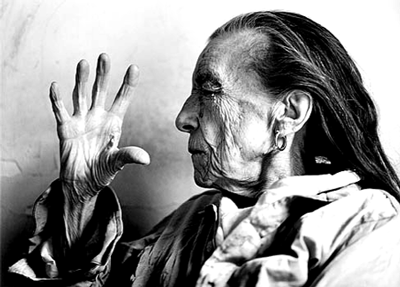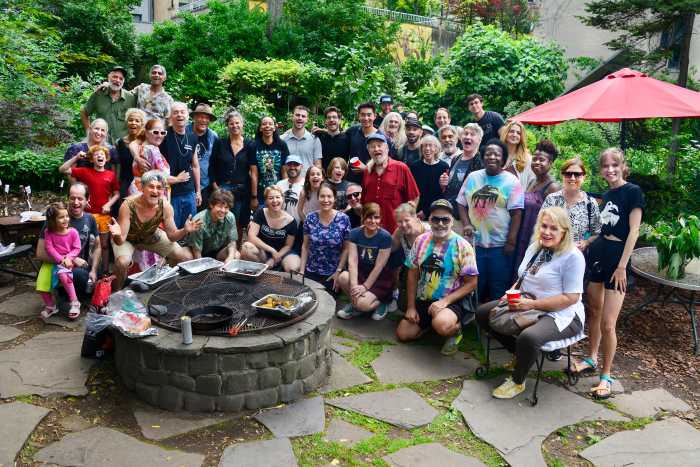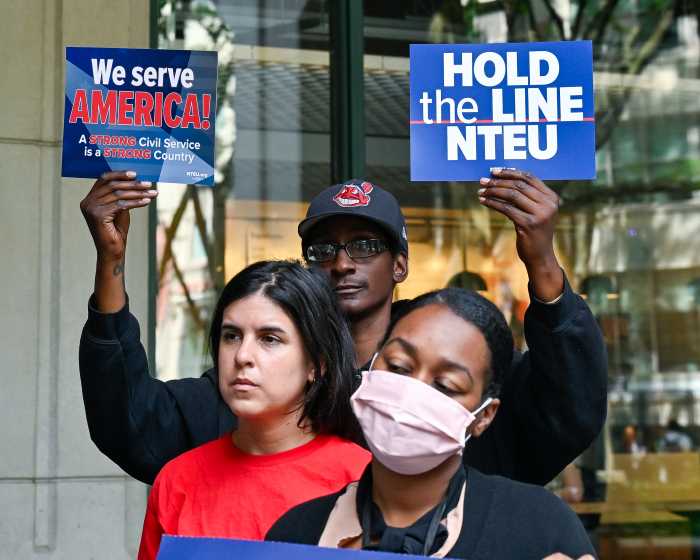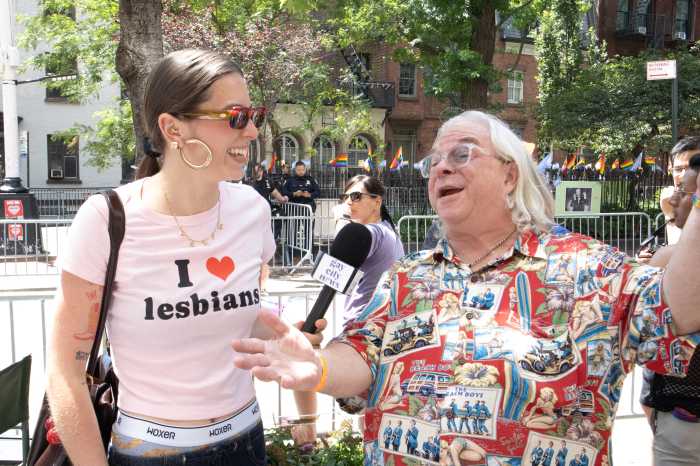By Jean-Louis Bourgeois
“Ridiculous!” said my mother, the sculptor Louise Bourgeois, last week. I had just mentioned that, more and more, she is referred to as one of the world’s greatest living artists. On May 12, New York University will award her an honorary doctorate. My brother Alain will accept the award on her behalf.
Last Christmas Day my mother turned 93. Ten years ago, she decided never to leave her brownstone. And she hasn’t. In her Chelsea “lair” her creative world is controlled, fixed and constant, enabling her to create forms and spaces that have enriched 20th-century art and beyond. She continues to work at home six days a week. On Sundays at 3 o’clock, she holds her well-known salons, where artists, writers, poets, performers and musicians share their work and lives.
So, when Mariet Westermann, the director of N.Y.U.’s art history graduate school, the Institute of Fine Arts (where my father, Robert Goldwater, taught art history for 15 years) told us that she wanted to propose my mother for an honorary doctorate, Professor Westermann was informed that under no circumstances would Louise attend the ceremony. We did not want a repeat of the high-key shenanigans at Harvard.
Lower-keyed shenanigans had occurred on other occasions that my mother had accepted honors but had not attended the ceremonies at which they were conferred.
First, in 1997, I was unique among 24 honorees — 23 of the actual honorees were present — as I represented my mother at the White House when President and Mrs. Clinton conferred on her a National Medal of Arts. There I gave the Clintons a $50 million dollar bill, jos money burned at Chinese funerals, demonstrating that, via a kind of mystical Western Union, you can take it with you.
Holding up the bill, the president, quick on his feet, told the TV cameras that he would be sure to pay taxes on the gift. The Daily News wrote up the story under the headline “Funny Bill Strikes Bill Funny.”
Then in 1999, the Japanese emperor offered my mother a Praemium Imperiale, a gold medal that the Japanese like to call a “Nobel Prize for Art.” Would she please come to Tokyo to accept the award? “No, thank you,” she replied. In that case, would she please come to a Midtown Manhattan hotel where a press conference would announce her receiving the prize? Again, “No, thank you.” So I was off to Tokyo, another unique stand-in.
In the Imperial Palace, I was more flush than in the White House. I flaunted a stash of not mere $50 million bills, but of $1 billion bills. I enjoyed giving one to the emperor. He responded with three monosyllables: “Heh. Heh. Heh.” Three possibilities. He was genuinely laughing as hard as he could. He was laughing because instructed to do so. He was choking on a grain of rice.
Then, in 2003, the only stand-in again — this time among 10, at the Knesset, receiving the Wolfe Prize, Israel’s most prestigious award for the arts and sciences. Having been officially graduated from apprentice wolosso (clown) to full wolosso in Djenné, Mali, West Africa (where I do human-rights work), at the Wolfe Prize ceremony I wore an enormous, leather-trimmed African cowboy hat, which I call my 20-gallon yarmulke.
The major shenanigans occurred in 1999, when Harvard wanted to give my mother an honorary Ph.D. As usual, my mother had no intention of attending that commencement. She asked me if I would accept the award in her name. Harvard is my alma mater, as well, as that of my father and brother Alain.
Gambling, my mother and I decided we would not tell Harvard until the last minute that she would not be attending commencement exercises. So, the day before commencement, I headed up to Cambridge by train. Knowing that my mother would not be there, I had decided that to make her “present” I would display a 30-inch-by-30-inch print of the famous portrait of her by Robert Mapplethorpe. Smiling impishly, she holds a huge phallus, her doll-like, latex sculpture, “Fillette.”
At 5:25 that afternoon, I informed the Ritz-Carlton hotel, where Harvard had reserved a room for my mother, that she would not be making the trip.
Five minutes later the room phone rang. It was a representative of commencement. “Where’s your mother?” she demanded. I told her that my mother had caught a cold and was unable to make the trip from New York.
The commencement representative was appalled and direct. She told me not to count on attending the “honorands” dinner that evening and that she was calling Harvard’s president, Neil Rudenstine. Soon the phone rang again. She was calling back to inform me that my mother would not be receiving the degree. Our “gamble” bit the dust.
I called my former professor at Harvard, James Ackerman, relaying to him the sorry turn of events. He invited me and my girlfriend at the time, Karen, for supper. It was quite morose. Afterward he called for a cab. As Karen and I walked toward the taxi, I heard a P.A. system bellow into the night, “Cabbie, stay where you are!” Drug bust? No. A motorcade roared past — a dozen black limousines escorted by a dozen white motorcycles with sidecars.
Karen and I got into the cab and asked the driver what was going on. He explained that the motorcade was escorting Alan Greenspan and the other “honorands” for the formal dinner to which Karen and I had been uninvited. I told him the whole story. In sympathy with my mother he quipped, “That’s disgusting. Tomorrow Harvard was planning to give me an honorary master’s in urban transportation. But in solidarity with your mother, I’m turning it down.”
I felt that Harvard’s rescinding the honorary degree to my mother was outrageous. Was the degree an award for outstanding achievement or is the commencement ceremony merely a show? The following morning I protested. I conducted a one-person picket line at the larger-than-life bronze sculpture of John Harvard in Harvard Yard. I brandished the Mapplethorpe portrait, complete with gargantuan phallus. Pardon my French, but I felt that Harvard had given my mother the finger, metaphorically, of course. So, politically and photographically, I flourished another “finger.”
With the exception of her salons, my mother’s voluntary decision to not leave her “lair” makes her much like a hermit. In choosing to give my mother an honorary doctorate, Harvard resembled the ancient Chinese prince who wanted a Cha’n Buddhist hermit to join his court, to adorn it with spiritual luster. For years the hermit had been standing on his head naked in a cave. One day a delegation from the prince arrived, seeking to persuade the hermit to join the court as hermit-in-residence.
The hermit righted himself from standing on his head and welcomed the lords and ladies into the cave. They were particularly distressed that he had no pants. The hermit assured them, his voice rising in anger, that he did have a pair of pants: They were the cave the delegation had entered, and he ended up shouting, “What are you doing in my pants?” The lords and ladies fled.
In a series of similar situations, I contend that my mother has been wiser than the Chinese sage. The sage’s turning down the prince corresponds to Harvard’s selecting my mother for a doctorate and then changing its mind. The result: anger and the honor withdrawn. By contrast, my mother’s “successful princes” have been in the past the Clinton White House, the Japanese emperor, the Israeli Knesset and now New York University — princes she has taught the wisdom to honor her while honoring simultaneously her private, immensely fruitful “lair.”
Jean-Louis Bourgeois is an activist and a self-described relaxivist and Groucho Marxist. He lives in Greenwich Village on Washington St.







































